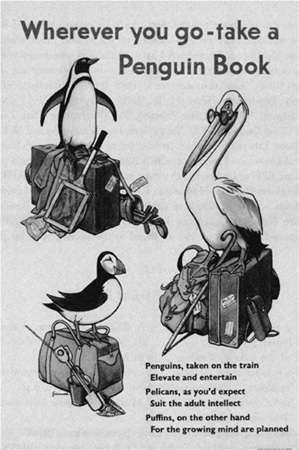
The day after Lane’s death, the merger of Penguin and Pearson Longman was announced: an American takeover by McGraw-Hill had been averted, and although Penguin was subsumed into Pearson Longman, and not the other way round, it remained a British institution. But, to some extent, that was neither here nor there: publishing was changing fast, and over the next thirty years Penguin would lose its unique identity and become, for better and for worse, no different from any other corporate publisher. As the flashes of orange faded from covers and spines and Pelican Books vanished into oblivion, Tschichold’s penguin and the Penguin Classics lingered on as reminders of what seemed like a vanished age.
Many of the most famous names on the Penguin list disappeared as publishers set up their own paperback lists and reverted the rights, but Penguin acquired its own source of supply when Peter Mayer first set up Viking as a hardback imprint in the UK in 1984, then bought the long-established firms of Hamish Hamilton and Michael Joseph from the Thomson Organization in 1985, so enabling the firm to publish in both hardback and paperback, and pay their authors full royalties on both. Books were no longer re-set for paperback publication, so ensuring adherence to the standards set by Tschichold and Schmoller, but used the hardback setting instead; the traditional A-format was abandoned in favour of the larger B-format, which was good for the profit margins but maddened those readers who liked to slip a Penguin into a jacket pocket; books were published, in both hardback and paperback, that Lane would have disdained as ‘breastsellers’ and their covers were no better and no worse than those of the upstart rivals so despised by Frostie and Bill Williams. And Penguin became, at last, a presence in America as well as on this side of the Atlantic: Viking, founded in the 1920s by Lane’s friend Harold Guinzburg, was acquired in 1975; as was the New American Library, the creation of Victor Weybright and Kurt Enoch. The wheel had come full circle: it was an irony which Lane, that most mischievous of publishers, would surely have relished.
